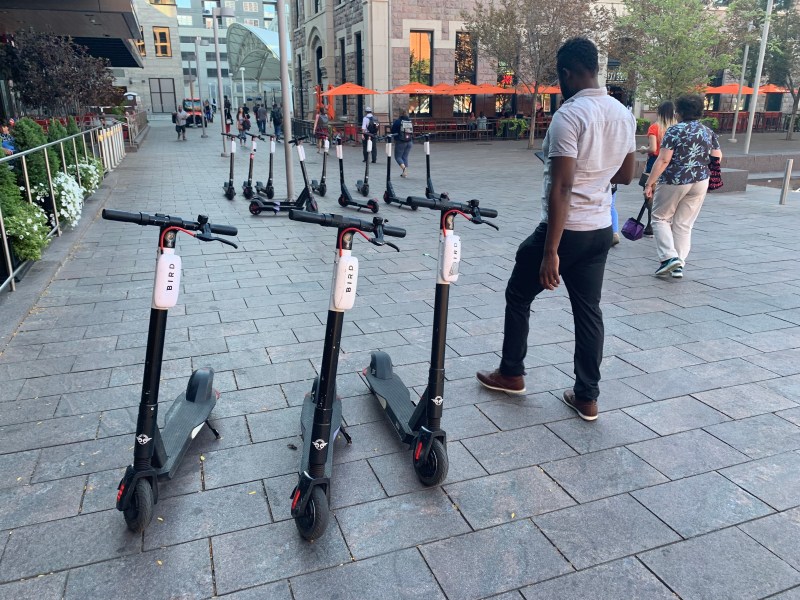Commentary: Bird’s Invasion of Union Station Shows Need for Scooter Watchdog
Bird's aggressive placement of scooters at Union Station demonstrates Denver's lax enforcement of existing rules and the need of a watchdog agency to police scooter companies.

Denver needs a watchdog agency to police the scooter companies.
In recent weeks, the scooter company Bird has repeatedly placed groups of scooters, what it calls “Bird Nests,” in every imaginable outdoor corner of the station, including parking 13 scooters directly in the middle of a pedestrian thoroughfare on Aug. 15, a practice it has repeated until Streetsblog asked the company about it yesterday.
Mackenzie Long, a spokesperson for Bird, said the company’s policy is to be “respectful of the public right of way and all persons who use it,” but offered no comment on the clear violations that Streetsblog uncovered.
Under city law, scooters must “not impede the normal and reasonable movement of pedestrian or other traffic.” The scooter companies are also required to keep the vehicles from operating at Union Station through a technology known as geofencing.
Clearly, the city is enforcing neither regulation.
That should change.

Mayor Michael Hancock and members of the City Council are leaving the city’s plazas, streets and sidewalks open to irresponsible exploitation. Instead of shrugging their shoulders and surrendering public spaces to the billionaire venture capitalists behind these companies, Denver officials should create a watchdog agency that will police the industry’s actions.
This opinion may surprise Streetsblog readers. As a news site that covers the fight for safe, sustainable modes of transportation, we encourage Denver’s embrace of electric scooters. We believe our streets need to change to become better places for people to walk, bike and scoot.
But government must step up to make sure companies consistently follow laws and regulations, just as it does at the federal level for meat, medications and motorcycle helmets. Like the Federal Drug Administration and the Department of Transportation before it, Denver should enforce scooter rules at the local level through a new scooter watchdog agency.

The agency I’m proposing should:
- Have the teeth to issue fines that start at $5,000 and go well into the millions.
- Be independent, to prevent the companies from influencing elected officials and city staff.
- Have adequate staff to monitor the companies and issue citations, perhaps by requiring one enforcement agent for every 500 scooters.
Of course, scooter companies should fund the new agency through fees.
The need to step up enforcement of Big Tech’s impact on cities is already clear. Silicon Valley companies have already recklessly deployed their services in cities and won’t stop on their own, according to John Tinnell, a professor at CU Denver. He pointed out last month in Streetsblog and the Los Angeles Times:
Like Uber and Airbnb before them, scooter companies aim to satisfy their customers with little regard for how their businesses affect our cities’ ecosystems. All three services tamper with neighborhood norms in ways that are annoying at first and deeply disturbing upon further inspection.
He goes on to point out how Uber and Lyft add more cars to the roads, increase traffic congestion and reduce ridership of public transportation. These impacts have frustrated Denver’s goal to reduce the number of people driving alone, obstructing related goals around mobility, pollution and the climate crisis.
Tinnell also warns that allowing tech companies to do whatever they want with public spaces sets a dangerous precedent.
If cities continue to offer an anything-goes approach to Big Tech, there will be no regulatory and enforcement framework to accommodate the certain arrival of other technologies, like delivery robots and drones, he writes. And that would further what Paris Mayor Anne Hidalgo has called “anarchy in the streets.”


